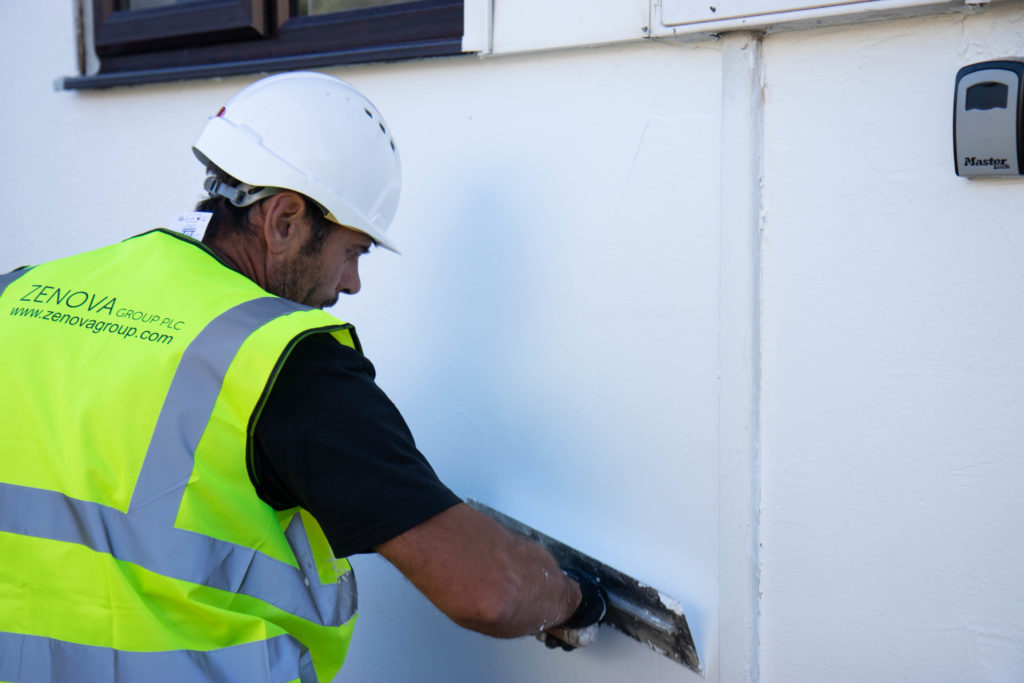Zenova Group PLC and Southdown Housing Association are collaborating on a groundbreaking project to reduce the carbon footprint of UK homes through the use of innovative and alternative forms of insulation.
The UK fire safety and heat management technology company is supplying its newly launched insulating paint and insulating render for the pilot. They are being applied to a semi-detached property to test and demonstrate its capabilities to support energy efficiency.
With UK housing providers, such as Southdown Housing Association, and local authorities, working to meet new government legislation to achieve zero carbon emissions by 2030, this pilot scheme will aim to prove the ability of Zenova’s technology to reduce homes’ energy bills and carbon footprint.
A successful outcome of the pilot will also support the ambitions of the Government’s new Heat and Buildings Strategy, which includes the phasing out of gas boilers, which will be replaced by heat pump technology. Air source heat pumps, in particular, work at low temperatures, and a property will need to be sufficiently insulated to enable efficient operation.
Having been independently tested in laboratory conditions to improve home insulation, the exterior of the property is being rendered with Zenova IR while the roof space and interior walls are being coated with the Zenova IP paint.
Throughout the pilot, the performance of the insulating materials will be monitored by third party testing company Synetica. In addition, Zenova is working with building services consultants, Slender Winter Partnership to undertake thermal U-Value modelling of the materials, which is the value used in the energy efficiency element of Part L of the Building Regulations and can also be used for Energy Performance Certificates (EPCs).
 In addition to demonstrating the benefits of applying the insulation technology, with the potential for it to be utilised across Southdown Housing Association’s estate, the pilot helps support the validation of Zenova’s solutions against government standards, and potential grant schemes.
In addition to demonstrating the benefits of applying the insulation technology, with the potential for it to be utilised across Southdown Housing Association’s estate, the pilot helps support the validation of Zenova’s solutions against government standards, and potential grant schemes.
The render and paint are part of a portfolio of products developed by the company, which also includes, fire protection paints, fire extinguishing fluids, ceiling sprinklers and a fire-retardant fluid that can be sprayed on forested areas, shrubs and grasses to prevent the spread of forest fires. The products have been devised following extensive research and development over the past four years by the business’ founders who are experienced in the fire safety and insulation industries, with backgrounds in roles such as firefighting, engineering and innovation. They have all received independent accreditation, with Zenova IP and Zenova IR achieving the required standards.
Tony Crawley, Chief Executive Officer of Zenova Group PLC, said: “Buildings’ heating, cooling, and lighting contribute to 28% of all global emissions, so its imperative to develop new, alternative insulation materials that can support the UK’s journey to net zero.
“We are pleased to be assisting with this very important pilot scheme with Southdown Housing Association, which will demonstrate the effectiveness of our insulating products to back up our impressive third-party thermal conductivity test results.
“The housing sector, local authorities, together with businesses and other organisations have some key obligations to meet with carbon reduction targets, driven by new legislation to reduce global warming. Our technology is a significant step forward in the market and has the potential to be a gamechanger in our collective ambitions to be a low carbon society and to reduce householders’ energy bills.”
Jim Aspdin, Director of Housing for Southdown Housing Association, commented: “Southdown Housing is pleased to have initiated this pilot programme with Zenova Group PLC using its insulating render and insulating paint products.
“We are confident that the results of this programme will demonstrate that as responsible custodians of housing for our tenants and the community we can progress towards the targeted reduction in energy costs and emissions given rising prices and of course world climate change.”









